They Thought They Were Free
THE GERMANS 1933-45
MILTON MAYER
With a New Afterword by Richard J. Evans
THE UNIVERSITY OF CHICAGO PRESS
CHICAGO & LONDON
The University of Chicago Press, Chicago 60637
The University of Chicago Press, Ltd., London
1955, 2017 by The University of Chicago
All rights reserved. No part of this book may be used or reproduced in any manner whatsoever without written permission, except in the case of brief quotations in critical articles and reviews. For more information, contact the University of Chicago Press, 1427 E. 60th St., Chicago, IL 60637.
Published 2017
Printed in the United States of America
26 25 24 23 22 21 20 19 18 17 1 2 3 4 5
ISBN-13: 978-0-226-52583-9(paper)
ISBN-13: 978-0-226-52597-6(e-book)
DOI: 10.7208/chicago/[9780226525976].001.0001
Library of Congress Cataloging-in-Publication Data
Names: Mayer, Milton, 19081986, author. | Evans, Richard J., writer of postface.
Title: They thought they were free : the Germans, 193345 / Milton Mayer ; with a new afterword by Richard J. Evans.
Description: Chicago ; London : The University of Chicago Press, 2017. | Originally published: Chicago ; London : The University of Chicago Press, 1955.
Identifiers: LCCN 2017027110 | ISBN 9780226525839 (pbk. : alk. paper) | ISBN 9780226525976 (e-book)
Subjects: LCSH: National socialism. | GermanySocial conditions19331945Case studies. | National characteristics, German. | JewsGermany.
Classification: LCC DD256.5 .M39 2017 | DDC 943.086dc23
LC record available at https://lccn.loc.gov/2017027110
 This paper meets the requirements of ANSI/NISO Z39.48-1992 (Permanence of Paper).
This paper meets the requirements of ANSI/NISO Z39.48-1992 (Permanence of Paper).
THIS BOOK IS DEDICATED
TO MY TEN NAZI FRIENDS:
Karl-Heinz Schwenke, tailor
Gustav Schwenke, unemployed tailors apprentice
Carl Klingelhfer, cabinetmaker
Heinrich Damm, unemployed salesman
Horstmar Rupprecht, high-school student
Heinrich Wedekind, baker
Hans Simon, bill-collector
Johann Kessler, unemployed bank clerk
Heinrich Hildebrandt, teacher
Willy Hofmeister, policeman
The Pharisee stood and prayed thus with himself,
God, I thank Thee, that I am not as other men are.
Foreword
As an American, I was repelled by the rise of National Socialism in Germany. As an American of German descent, I was ashamed. As a Jew, I was stricken. As a newspaperman, I was fascinated.
It was the newspapermans fascination that prevailedor at least predominatedand left me dissatisfied with every analysis of Nazism. I wanted to see this monstrous man, the Nazi. I wanted to talk to him and to listen to him. I wanted to try to understand him. We were both men, he and I. In rejecting the Nazi doctrine of racial superiority, I had to concede that what he had been I might be; what led him along the course he took might lead me.
Man (says Erasmus) learns at the school of example and will attend no other. If I could find out what the Nazi had been and how he got that way, if I could spread his example before some of my fellow-men and command their attention to it, I might be an instrument of their learning (and my own) in the age of the mass revolutionary dictatorship.
In 1935 I spent a month in Berlin trying to obtain a series of meetings with Adolf Hitler. My friend and teacher, William E. Dodd, then American Ambassador to Germany, did what he could to help me, but without success. Then I traveled in Nazi Germany for an American magazine. I saw the German people, people I had known when I visited Germany as a boy, and for the first time realized that Nazism was a mass movement and not the tyranny of a diabolical few over helpless millions. Then I wondered if Adolf Hitler was, after all, the Nazi I wanted to see. By the time the war was over I had identified my man: the average German.
I wanted to go to Germany again and get to know this literate, bourgeois, Western man like myself to whom something had happened that had not (or at least not yet) happened to me and my fellow-countrymen. It was seven years after the war before I went. Enough time had passed so that an American non-Nazi might talk with a German Nazi, and not so much time that the events of 193345, and especially the inner feeling that attended those events, would have been forgotten by the man I sought.
I never found the average German, because there is no average German. But I found ten Germans sufficiently different from one another in background, character, intellect, and temperament to represent, among them, some millions or tens of millions of Germans and sufficiently like unto one another to have been Nazis. It wasnt easy to find them, still less to know them. I brought with me one asset: I really wanted to know them. And another, acquired in my long association with the American Friends Service Committee: I really believed that there was that of God in every one of them.
My faith found that of God in my ten Nazi friends. My newspaper training found that of something else in them, too. They were each of them a most marvelous mixture of good and bad impulses, their lives a marvelous mixture of good and bad acts. I liked them. I couldnt help it. Again and again, as I sat or walked with one or another of my ten friends, I was overcome by the same sensation that had got in the way of my newspaper reporting in Chicago years before. I liked Al Capone. I liked the way he treated his mother. He treated her better than I treated mine.
I foundand findit hard to judge my Nazi friends. But I confess that I would rather judge them than myself. In my own case I am always aware of the provocations and handicaps that excuse, or at least explain, my own bad acts. I am always aware of my good intentions, my good reasons for doing bad things. I should not like to die tonight, because some of the things that I had to do today, things that look very bad for me, I had to do in order to do something very good tomorrow that would more than compensate for todays bad behavior. But my Nazi friends did die tonight; the book of their Nazi lives is closed, without their having been able to do the good they may or may not have meant to do, the good that might have wiped out the bad they did.
By easy extension, I would rather judge Germans than Americans. Now I see a little better how Nazism overcame Germanynot by attack from without or by subversion from within, but with a whoop and a holler. It was what most Germans wantedor, under pressure of combined reality and illusion, came to want. They wanted it; they got it; and they liked it.
I came back home a little afraid for my country, afraid of what it might want, and get, and like, under pressure of combined reality and illusion. I feltand feelthat it was not German Man that I had met, but Man. He happened to be in Germany under certain conditions. He might be here, under certain conditions. He might, under certain conditions, be I.
If Iand my countrymenever succumbed to that concatenation of conditions, no Constitution, no laws, no police, and certainly no army would be able to protect us from harm. For there is no harm that anyone else can do to a man that he cannot do to himself, no good that he cannot do if he will. And what was said long ago is true: Nations are made not of oak and rock but of men, and, as the men are, so will the nations be.
My compulsion to go to Germany and to live there, in a small town, with my wife and children was spurred by Carl Friedrich von Weizscker, of Gttingen University, who, with his wife Gundi, lived in my home while he served as Visiting Professor of Physics at the University of Chicago in 194849. I corresponded with an old friend, James M. Read, who was serving as Chief of Educational and Cultural Relations in the United States High Commission for the Occupation of Germany. Messrs. Read and Weizscker converged on Max Horkheimer, Dean of the Institute for Social Research, in Frankfurt University, and he arranged my appointment. What I did after I got there (and after I got back) was my own responsibility, but where I went was the responsibility of my three friends. It was they who packed me off to live for a year, as close as possible to the Germans, as far as possible from the conquering Ami, in the town I call Kronenberg.

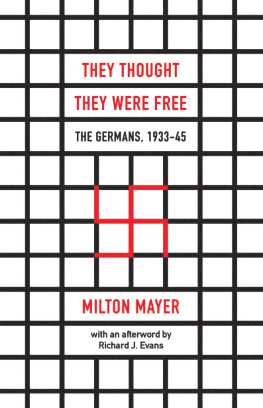
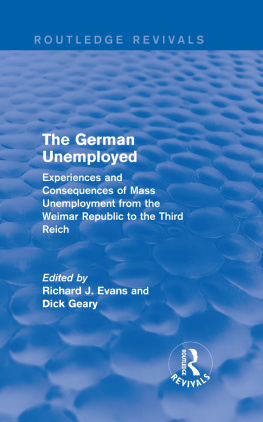
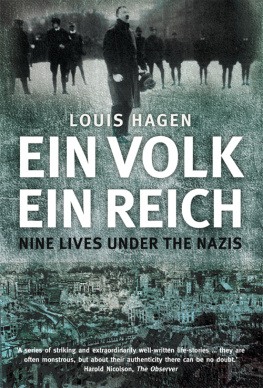


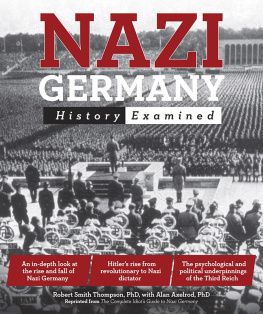
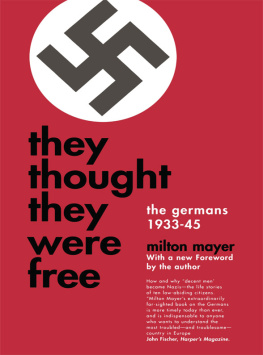
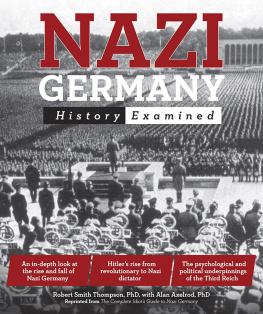
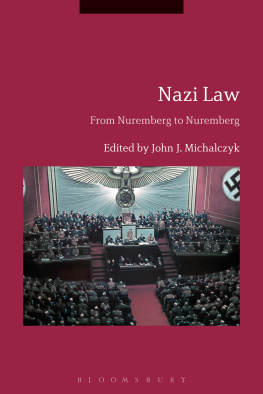
 This paper meets the requirements of ANSI/NISO Z39.48-1992 (Permanence of Paper).
This paper meets the requirements of ANSI/NISO Z39.48-1992 (Permanence of Paper).